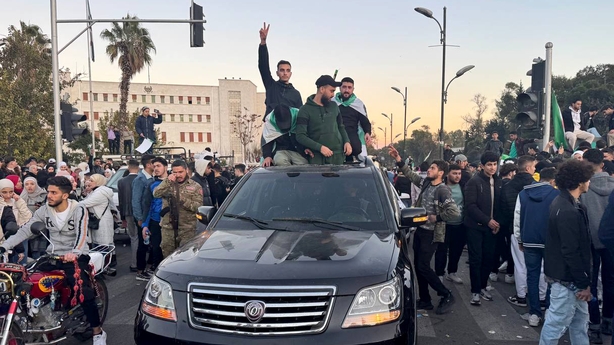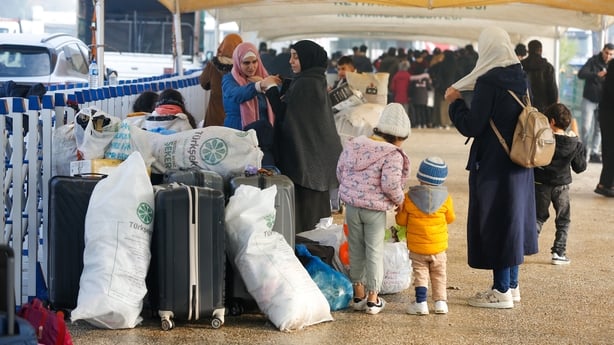Thousands of jubilant people rallied in central Damascus and cities across Syria to celebrate during the first Friday prayers since the ousting of president Bashar al-Assad.
More than half a century of brutal rule by the Assad clan came to a sudden end, after a lightning rebel offensive swept across the country and took the capital.
Mr Assad fled Syria, closing an era in which suspected dissidents were jailed or killed, and capping nearly 14 years of war that killed more than 500,000 people and displaced millions.
Abu Mohammad al-Jolani, head of the Islamist group Hayat Tahrir al-Sham (HTS) which spearheaded the offensive, had called on Syrians "to go to the streets to express their joy".
They continued to do so into the night, AFPTV live images showed from Umayyad Square in Damascus which was jammed with vehicles, people, and waving flags as fireworks exploded.
In the early days of Syria's uprising in 2011, pro-democracy protesters gave their Friday gatherings, on the Muslim day of prayer and rest, a different name every week.
On the first such day after Mr Assad's fall they called it: "Friday of victory".
Thousands flocked to the capital's landmark Umayyad Mosque, some raising the three-star Syrian independence flag which none dared wave in the capital during Assad's repressive rule.

Exhilarated crowds chanted, "The Syrian people is one".
Khalil Rimo, 52, said he felt "like I'm dreaming".
"I still can't believe that I'm standing next to the Umayyad Mosque... and there are no government thugs" asking for ID, Mr Rimo said.
Crowds also gathered in the squares and streets of other Syrian cities, including Homs, Hama and Idlib.
There was a festive and relaxed atmosphere as hundreds rallied in the main square of Syria's second city Aleppo, a scene of fierce fighting during the country's civil war, AFP correspondents said.
A huge billboard depicting Assad and his father Hafez was set on fire.
"The Assad father and son oppressed us, but we have liberated our country from injustice," a white-bearded policeman at the scene said.
Ahmad Abd al-Majed, 39, an engineer who has returned to Aleppo from Turkey, said many shed "tears of joy and happiness".
"Syrians deserve to be happy," he said.
In the southern city of Sweida, the heartland of Syria's Druze minority, hundreds took to the streets, singing and clapping in jubilation.
"Every province is celebrating this great victory," said Haitham Hudeifa, 54.
Sunni Muslim HTS is rooted in Syria's branch of Al-Qaeda and designated a terrorist organisation by many Western governments, which now face the challenge of how to approach the country's new leadership.
The group has sought to moderate its rhetoric, and the interim government insists the rights of all Syrians will be protected, as will the rule of law.
The European Union was seeking "to establish contacts" with the new rulers in the near future, an EU official told AFP on condition of anonymity.
We need your consent to load this rte-player contentWe use rte-player to manage extra content that can set cookies on your device and collect data about your activity. Please review their details and accept them to load the content.Manage Preferences
Some Middle Eastern governments have announced they would reopen their diplomatic missions in Syria.
The United Nations refugee agency said the new government had sent "constructive" initial signals, including asking the organisation to stay in the country.
Leaders of the Group of Seven democratic countries, who were due to meet virtually on Friday, said they were ready to support the transition to an "inclusive and non-sectarian" government in Syria.
They called for the protection of human rights, while emphasising "the importance of holding the Assad regime accountable for its crimes".
Inside much of Syria, the focus is turning towards unravelling the secrets of Assad's rule, and particularly the network of detention centres and suspected torture sites.
Syrians have flooded to prisons, hospitals and morgues in search of long-disappeared loved ones.
"I turned the world upside down looking," Abu Mohammad told AFP as he searched for news of three missing relatives at the Mazzeh airbase in Damascus.
"We just want a hint of where they were."
The International Committee of the Red Cross said it has documented more than 35,000 cases of disappearances during Mr Assad's rule, with the actual number likely far higher.
While Syrians celebrate the end of Mr Assad's brutal government system, they face a struggle for basic necessities in a country ravaged by war, sanctions and runaway inflation.
The EU announced the launch of an "air bridge" operation to deliver an initial 50 tonnes of health supplies via neighbouring Turkey.
Bashar al-Assad Assad was propped up by Russia, where a senior Russian official told US media he has fled, as well as Iran and Lebanon's Hezbollah militant group.
The rebels launched their offensive on 27 November, the same day a ceasefire took effect in the Israel-Hezbollah war, which saw Israel inflict staggering losses on Mr Assad's Lebanese ally.

Both Israel and Turkey, which backs some of the rebels who ousted Assad, have since carried out strikes inside Syria.
Israel has sent troops into a UN-patrolled buffer zone that separated Israeli and Syrian forces on the Golan Heights, in a move the UN said violated a 1974 armistice.
The army has been ordered to "prepare to remain" there throughout the winter, Defence Minister Israel Katz's office said.
Speaking in Jordan yesterday, US Secretary of State Antony Blinken stressed the importance of "not sparking any additional conflicts" after mentioning both Israeli and Turkish military activity in Syria.
In Baghdad, Mr Blinken said that "as Syria transitions from the Assad dictatorship to hopefully a democracy", it should "not become in any way a platform for terrorism".
The United States has troops in both Syria and Iraq as part of a coalition against the Islamic State jihadist group.
Iraq's Prime Minister Mohammed Shia al-Sudani, in his meeting with Mr Blinken, warned against further instability and "any aggression on Syrian territories by any party", according to a statement from his office.
New Syrian authorities ask UN refugee agency to remain
Syria's new interim authorities asked the United Nations refugee agency to remain in the country following Mr Assad's ousting, sending a "constructive" signal, the organisation said.
"The needs are absolutely huge," Gonzalo Vargas Llosa, UNHCR's representative in Syria, told reporters in Geneva by video link from Damascus.
Since Mr Assad's ouster, the agency had had "some contact with the interim authorities", he said, adding: "the initial signals that they are sending us are constructive".
The authorities were saying "they want us to stay in Syria, that they appreciate the work that we have been doing now for many years, that they need us to continue doing that work," Vargas Llosa said.
Most importantly, he said the interim authorities had indicated "they will provide us the necessary security to carry out those activities".
The International Committee of the Red Cross meanwhile highlighted the towering task ahead to help Syrian families whose loved ones disappeared under the Assad rule.
In recent years, "we have been approached by tens of thousands of families who have come to us with what we call a tracing request", said Stephan Sakalian, who heads the organisation's Syria delegation.
The ICRC has documented over 35,000 cases of disappearances, he told reporters from Damascus, adding the true number was likely far higher.
The organisation is calling for the protection and preservation of archives found in detention facilities and elsewhere, as well as of burial sites.
Thousands of Shia Muslims flee to Lebanon
Tens of thousands of Syrians, mostly Shia Muslims, have fled to Lebanon since Sunni Muslim Islamists toppled Bashar al-Assad, fearing persecution despite assurances from the new rulers in Damascus that they will be safe, a Lebanese official said.
At the border with Lebanon, where thousands of people were trying to leave Syria yesterday, a dozen Shia Muslims described threats made against them, sometimes in person but mostly on social media.
Their accounts reflect fears of persecution despite promises of protection by Hayat Tahrir al-Sham (HTS) - the Sunni Islamist group which has emerged as the dominant force in the new Syria but is far from being the only armed faction on the ground.
Shia communities have often been on the frontline of Syria's 13-year civil war, which took on sectarian dimensions as Assad, from the minority Alawite faith, mobilised regional Shia allies, including Lebanon's Hezbollah, to help fight Sunni rebels.
The senior Lebanese security official said more than 100,000 people, largely members of minority faiths, had crossed into Lebanon since Sunday, but could not give an exact number because most of them had used illegal crossings along the porous border.
At the main border crossing between Syria and Lebanon, Samira Baba said she had been waiting for three days to enter Lebanon with her children.
"We don't know who sent these threats, on WhatsApp and Facebook," she said. "The rebels in charge haven't openly threatened us, so it could be other factions, or individuals. We just don't know. But we know it's time to leave," she said.
The new Syria holds uncertainty for many, especially minorities.
Shia Muslims are thought to number around a tenth of the population, which stood at 23 million before the war began.
While HTS, which has cut its ties with the global jihadist network al Qaeda, is the most powerful of the constellation of factions that fought Mr Assad, there are numerous other armed groups, many of which are Islamist.
Ayham Hamada, a 39-year-old Shia Muslim who was serving in the army when Mr Assad fell, said the regime's collapse was so sudden that it left him and his brother, also a soldier, scrambling to decide whether to stay or go.
They fled to Damascus where they received threats, he said, without elaborating. "We are afraid of sectarian killings... this will be liquidation."
Despite assurances voiced by HTS leader Ahmed al-Sharaa, Hamada said minorities have been left without protection after Assad's sudden flight. "Bashar took his money and fled and didn't pay attention to us," he said.

